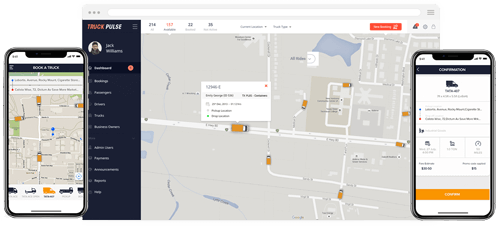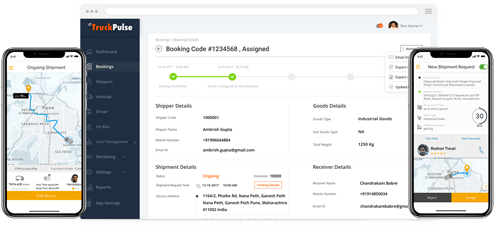The vision of driverless vehicles has been developing into our minds for years now. As the idea of self-driving cars is slowly approaching our neighborhoods, we still possess some apprehensions about consenting on other autonomous commercial vehicles such as self-driving trucks. However, the industry is quite positive about the potential of autonomous driving trucks and how it may take over within the next 10 years.
Many experts suggest the introduction of driverless technology into commercial vehicle industry can gobble up as many as 1.8 million trucks driving jobs. Trepidations over new technology are not unheard of, as this has always been the first reaction to any technological advancement. Nonetheless, advanced technology should be embraced for the benefits it has to offer. Similarly, self-driving technology in trucks offers multiple advantages including improved productivity, cost-effectiveness, fuel efficiency, and organized traffic. So, before you arrive on a conclusion, this blog helps you in understanding the industry inclination, issues, and the future deployment of driverless trucks.
Major Companies Striding Towards Self-Driving Trucks

The number of major international companies slowing shifting their gears towards implementing self-driving technology in trucks is growing in every industry quarter. The autonomous truck industry is moving profoundly compared to the driverless car’s industry, which may appear jazzy from the outside but still has a long way to go. Starting from established well-known automakers to newly launched start-ups, the industry seems truly enthusiastic about self-driving technology. Some of the biggest names currently dedicating their time, energy and capital in this field are mentioned below:
- Waymo
This is widely known for being Google’s self-driving division. Developing and testing driverless trucks for more than a year now, Waymo first launched the driverless technology in trucks for facilitating freight delivery in Atlanta’s Google data centers. During the testing phase, the company is taking various measures for safety that includes having a well-trained truck driver always available behind the wheels to take charge in case of any mishap or system failure.
- Embark
Since initiating the manufacturing, development, and testing facility in San Francisco in the year 2016, Embark has been focused on their goal of sparing truck drivers some more time to enhance delivery efficiency. The concept is to allow drivers some extra time in hand while the technology takes over on highways so that they can deliver more every day. Embark is working a technology where trained drivers would only take over when the vehicle exits the highway.
- Tesla
The Company, headed by the technological entrepreneur Elon Musk, first launched self-driving trucks at the end of the year 2017. Tesla is confident of starting autonomous trucks delivery by the end of 2019. The technology they are focusing on automates acceleration, braking, and steering, where all three would be controlled by a computer. However, human intervention may be required at times in Tesla manufactured self-driving vehicles.
- TuSimple
Unlike most automated vehicles using special laser-based radar technology, TuSimple is specializing in camera technology to automate their trucks and cars. Based in China and California, the company is already in the testing phase. With the need to have a licensed driver present in the vehicle at all times, the company claims the technology to be much cheaper, safer and efficient.
- Daimler
The parent company of Mercedes-Benz is one of the oldest players in the arena of self-driving vehicles. Freightliner Trucks are the testing mode of their technology since the year 2014. Their plan is always to keep a driver on the edge for safety, more so when the vehicle is exiting the freeway.
- Volvo
This is the first very few companies that demonstrated how autonomous driving trucks would actually work. A demonstration on how truck platooning improves unnecessary accelerating and braking, which eventually ensures safety for everyone on the road in the year 2016 was ground-breaking for many reasons. Even if it may have appeared dull at the time, it very efficiently highlighted the need to focus on safety measure for such advancements.
How Soon Are We Getting There?
If we only look at the massive investment that has gone into making driverless vehicles a reality, a gust of disappointment creeps in as the arrival of the said machine in a true sense seems delayed. However, more disappointment may be in line for driverless cars, but it looks like the trucking industry is embracing the technology rather smartly.

Thinking about the future of self-driving trucks in the world, the developers are coming up with different business models for efficiently deploying such technology without hindering the balance. Below are five business models for deploying self-driving trucks into the industry smoothly:
- Driver-Assist Evolution
Rather than trying to replace drivers by introducing advanced technology, this approach is all about providing effective support functions to the driver and enhancing performance. These can be called self-driving semi trucks.
- Transfer Hub Model Driver-to-Driverless Handoffs
This concept deals with limiting autonomous driving trucks to freeways, where traffic is easily manageable. And the human hand would handle the complex areas like intersections and internal traffic like usual.
- Tele-operation Remotely Monitored Trucks
To overcome the limitations of self-driving technology, some companies are deploying a teleoperated system to manage the vehicle movement.
- Next-Level Platooning Unmanned “Follower” Trucks
Synchronizing braking and adaptive control of the vehicle, platooning technology enables two or more trucks to move in an aerodynamic line. This deployment is next level automation and is expected to empower commercial vehicles soon.
- Private Site Operation
This is probably the least controversial use of automatic driving technology with a restricted area of operation, which eliminates the possibilities of mishaps to a great extent. Already in use on construction sites and mines, this deployment is almost here.
Pros & Cons of Self-Driving Trucks

- Fewer Traffic Jams and Road Congestions, especially on freeways, as they are programmed for most favorable route usage.
- We can look forward to less number of road accidents since many studies have suggested most accidents on roads can be attributed to manual mistakes.
- Apart from the upfront initial investment, self-driving trucks are expected to reduce organizational costs.
- With programming optimal fuel consumption, less pollution is one of the prime features.
- Offers multiple support features for the drivers enhancing productivity.
- It may have an impact on truckers and many drivers may lose their job.
- Since it becomes machine optimized vehicle, there are several security concerns such as vulnerability to potential hacking is often highlighted by experts.
- With everything becoming data-based, this opens even our automobiles to multiple privacy apprehensions.
Conclusion
The future possibilities for self-driving technology are infinite where science is even positive about introducing the life-transforming technology in spacecraft. Self-driving spacecraft is something that scientists and space engineers are excited about as they claim it has the potential to save earth even from a threatening asteroid attack.
There is no denying that progressive technology such as self-driving trucks and cars come with certain challenges. However, embracing advancement while constantly striving to resolve the challenges is how we all need to move ahead. The advantages that self-driving technology will offer are humongous to disregard. So, rather than discouraging the technology, we need to look at the positives and prepare ourselves to take all required safety measures because irrefutably, these driverless trucks are here to stay.
Author's Bio




